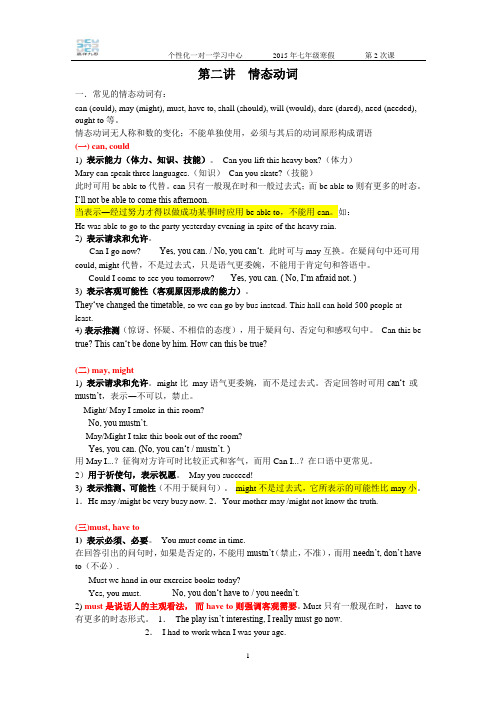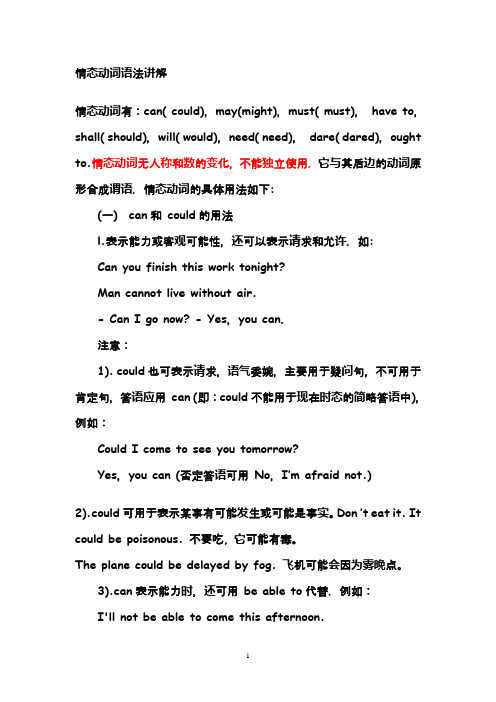(完整版)初一情态动词语法讲解
8.初中英语语法讲解-情态动词

情态动词的用法-could的用法
②表示惊异、怀疑 你怎么会这样粗心 How could you be so careless?(惊异、 怀疑的情绪) 我们当时以为那个故事不会是真的。 We thought the story could not be true. (不可能)
情态动词的用法-could的用法
情态动词的用法-Can的用法
注意: a,在口语中can常可用来代替may,来询问 或说明一件事能不能做 b, can 和 be able to在表示能力这一点是 同义词, I can speak English.=I am able to speak English. 我会说英语
情态动词的用法-could的用法
情态动词的用法- must的用法
①表示“必须”或“应当”。 我们必须依靠自己. We must rely on ourselves. 你必须在四点前干完这项工作 You must finish the work before four o’clock.
情态动词的用法- must的用法
情态动词的用法-may的用法
②表示说话人的猜测,认为某一事情“或 许”或“可能”发生 我们也许今天晚上会来看你。 We may call on you this evening.
她可能不喜欢这个地方。 She may not like this place.
情态动词的用法-may的用法
Could是 can的过去式 ①表示过去的能力或“可能性” 我年轻时跑得很快 I could run very fast when I was young. (过去的能力) 我一点也听不懂他说的话。 I couldn’t understand what he said at all.
情态动词的用法初一

情态动词的用法初一在我们初一的英语学习中,情态动词可是一个非常重要的知识点。
情态动词虽然数量不多,但用法却不少,而且在表达情感、态度和推测等方面发挥着重要的作用。
今天,咱们就一起来好好聊聊初一阶段常见的情态动词及其用法。
首先,咱们来认识一下常见的情态动词。
像 can、could、may、might、must、shall、should、will、would 等等,这些都是初一阶段会接触到的情态动词。
先来说说 can 和 could 。
can 表示“能,会”,用来描述一个人具备做某事的能力。
比如说,“I can swim”(我会游泳。
)这里的 can 就表明了“我”有游泳这个技能。
could 是 can 的过去式,不过它也可以用在比较委婉、客气的请求或建议中,比如“Could you please help me?”(您能帮帮我吗?)接着是 may 和 might 。
may 表示“可能,也许;可以”。
当表示可能性时,语气比 must 要弱一些,比如“It may rain tomorrow”(明天可能会下雨。
)当表示许可时,“You may go now”(你现在可以走了。
)might 是 may 的过去式,不过它的语气比 may 更加委婉、不确定。
再看看 must 。
must 表示“必须”,语气很强。
例如,“You must finish your homework before watching TV”(你必须在看电视之前完成作业。
)要注意哦,must 的否定形式是 mustn't,意思是“禁止,不许”,比如“You mustn't play on the road”(你不许在马路上玩耍。
)然后是 shall 和 should 。
shall 主要用于第一人称,用来征求对方的意见或提出建议,比如“Shall we go shopping this afternoon?”(今天下午我们去购物好吗?)should 表示“应该”,常用来给出劝告、建议等,比如“You should eat more vegetables”(你应该多吃蔬菜。
(完整版)七年级情态动词

第二讲情态动词一.常见的情态动词有:can (could), may (might), must, have to, shall (should), will (would), dare (dared), need (needed), ought to等。
情态动词无人称和数的变化;不能单独使用,必须与其后的动词原形构成谓语(一) can, could1) 表示能力(体力、知识、技能)。
Can you lift this heavy box?(体力)Mary can speak three languages.(知识)Can you skate?(技能)此时可用be able to代替。
can只有一般现在时和一般过去式;而be able to则有更多的时态。
I‘ll not be able to come this afternoon.当表示―经过努力才得以做成功某事‖时应用be able to,不能用can。
如:He was able to go to the party yesterday evening in spite of the heavy rain.2) 表示请求和允许。
-----Can I go now? ----- Yes, you can. / No, you can‘t. 此时可与may互换。
在疑问句中还可用could, might代替,不是过去式,只是语气更委婉,不能用于肯定句和答语中。
---- Could I come to see you tomorrow? ---- Yes, you can. ( No, I‘m afraid not. )3) 表示客观可能性(客观原因形成的能力)。
They‘ve changed the timetable, so we can go by bus instead. This hall can hold 500 people at least.4)表示推测(惊讶、怀疑、不相信的态度),用于疑问句、否定句和感叹句中。
完整版初中英语语法情态动词讲解

完整版初中英语语法情态动词讲解一、选择题1.It’s amazing that the pen ________turn voice into text with few mistakes.A.can B.must C.may D.need2.—Will your mother be at home this Saturday?—Hard to say. She _______go to the countryside to see my grandparents.A.must B.may C.can D.would3.You ________ require others to do with the problem like you. Everyone has his own way. A.mustn’t B.needn’t C.may not D.shouldn’t 4.—Mum, why do I have to wear a mask before entering the supermarket?—For your health and safety, you ________ be too careful.A.shouldn’t B.can’t C.mustn’t D.needn’t 5.—Will my car be ready by the end of the day?—It ________ be, sir. I’ll call if there’s any problem.A.must B.could C.shall D.should6.We shouldn’t throw any objects from the building. Even a small object ________ cause serious injuries or death, when dropped from a great height.A.must B.should C.may D.need7.— Is Lang Lang going to perform at Art Center this Friday?— Yes. It ________ be him. He has been here for three days.A.might B.must C.mustn’t D.may8.You'd better __________ hard from now on, __________ you will fail the exam. A.work; and B.working; or C.working; and D.work; or9.To avoid ________, we’d better ________ the parents’ meeting online.A.gather; hold B.gathering; hold C.gather; holding D.to gather; to hold 10.A lot of online resources ________ be used either by teachers at school or parents at home. A.can B.should C.need D.must 11.—Could I join you in the programme?—Sorry, you ________. You are too young.A.shouldn’t B.mustn’t C.c an’t D.needn’t12.If you buy your mum an iRobot floor cleaner, she ________ sweep the floor every day. A.can’t B.mustn’t C.needn’t D.shouldn’t 13.—Have you decided to take up teaching as career after graduation?—I ________ go abroad for further education instead. But it depends.A.must B.should C.may D.shall 14.—The high school entrance examination is coming!—Yes, our teacher tells us we _______ be too careful while taking exams.A.mustn't B.shouldn't C.needn't D.can't15.---Will you be back early this evening?---Yes, but I ________ be a little late. Our boss sometimes has extra work for us.A.may B.must C.need D.will 16.—Amy, I hear you've got many foreign coins._______ I have a look?—Of course, I'll fetch them for you.A.May B.MustC.Should D.Need17.My bike was broken yesterday,so I____walk home.A.might B.had to C.must D.could 18.—Would you please________in that way? That’s not safe!—Sorry. I won’t do it any more.A.not driving B.not to drive C.no driving D.not drive 19.Dr. Zhong Nanshan once said, "To prevent the spread of this disease, we________never be too careful."A.can B.may C.must D.should 20.—Where is Tom? I am considering ________ him about the result of the exam.—Oh. You ________. He has known it already.A.to tell; can't B.telling; needn't C.tell; mustn't D.told; shouldn't 21.—How beautiful the winter jasmines (迎春花) are!—Yes. These golden-yellow flowers ________ be widely seen in my city in March.A.must B.can C.would D.should22.We've discussed every detail of this plan and have got everything ready. But still something ________ go wrong. We still have to be very careful.A.must B.should C.would D.may23.Never throw objects from the building. Even a small object ________ cause serious injuries, or death, when dropped from a great height.A.must B.should C.may D.need24.—Will Jim come to Yangzhou for a holiday?—He ________come and it depends on how much homework he will have.A.may B.should C.must D.need25.When people are waiting at the zebra crossing, cars and buses ________ wait and let them go first.A.must B.may C.can D.need26.—Shall I tell him the change of the time right now?—I’m afraid you ________, otherwise he will be late for the meeting.A.can B.may C.must D.need 27.—Seventy dollars for such a dress! You ________ be joking!—I’m serious. It’s made of silk from Hangzhou.A.must B.need C.will D.can 28.—Excuse me. I haven’t finished reading the book yet. May I keep it a bit longer?— Sorry, you ________. You must return it on time.A.needn’t B.can’t C.won’t D.shouldn’t29.Hurry up, or we ________ miss the beginning of the film.A.should B.must C.may D.have to30.For the safety of the passengers, objects like guns ________ be carried on board.A.may not B.needn’t C.might not D.mustn’t 31.—What is that young lady’s job?— She ________ be a nurse, I’m not sure.A.must B.may C.need D.would32.— What do you think of the show yesterday?— Some of them were really good but others ________ be better.A.will B.must C.need D.can 33.—Who’s the man over there? Is that Mr. Black?—It ________ be him. Mr. Black is much taller than that man.A.may B.must C.can’t D.mustn’t 34.—________ I see your ID card? We have to check your personal information.—Sure. Here you are.A.May B.Need C.Should D.Must35.You ________ drive after drinking alcohol(酒). It’s against the law.A.mustn’t B.needn’t C.couldn’t D.wouldn’t36.—I think they are enough. We ________ make so many chairs.—I don’t think so. Because nearly a quarter of them need ________.A.don’t need to; mending B.needed; to be mendedC.don’t nee d; mend D.need; to mend37.We teenagers ________ have dreams. With dreams and hard work, anything amazing________ be created.A.may; can B.might; should C.should; can D.must; has to 38.—Who’s singing next door? Is it Miss Wang?—It ________ be her. She’s having the board meeting.A.can’t B.shouldn’t C.mustn’t D.needn’t39.It’s of great importance to protect the environment. Each of us ________ take an active part in it.A.can B.may C.would D.should 40.Mr. Black ________ be at home now. He went abroad on vacation last Friday.A.can’t B.mustn’t C.needn’t D.shouldn’t【参考答案】一、选择题1.A解析:A【详解】句意:神奇的是,这支笔能把声音转换成文字,而且很少出错。
情态动词语法讲解

情态动词语法讲解情态动词有:can( could),may(might),must( must), have to,shall( should),will( would),need( need), dare( dared),ought to.情态动词无人称和数的变化,不能独立使用.它与其后边的动词原形合成谓语.情态动词的具体用法如下:(一) can和 could的用法l.表示能力或客观可能性,还可以表示请求和允许.如:Can you finish this work tonight?Man cannot live without air.- Can I go now? - Yes,you can.注意:1). could也可表示请求,语气委婉,主要用于疑问句,不可用于肯定句,答语应用 can (即:could不能用于现在时态的简略答语中),例如:Could I come to see you tomorrow?Yes,you can (否定答语可用 No,I’m afraid not.)2).could可用于表示某事有可能发生或可能是事实。
Don ’t eat it. It could be poisonous. 不要吃, 它可能有毒。
The plane could be delayed by fog. 飞机可能会因为雾晚点。
3).can表示能力时,还可用 be able to代替.例如:I'll not be able to come this afternoon.但表示过去能成功做成某事, 要用was/were able to: The little bo y was able toescape from the big fire.4).can 可能,表示有时会… Jogging canbe harmful to the health.2.表示惊异、怀疑、不相信的态度。
(主要用在否定句、疑问句或感叹句中)Can this be true? How can yoube so careless!This cannot be done by him.3“ can( could)十 have十过去分词”的疑问或否定形式表示对过去发生的行为怀疑或不肯定.例如:He cannot have been to that town.Can he have got the book?4. could have +过去分词,表示过去本来可以做但却未做 What you said is right, but you could have done it better.5.一些常用句型:1).can not/never … too/enough…One can’t be too careful.I can’t thank you enoug h.2).can’t help doing… can’t help butdo…can’t but do…(二) may和 might的用法1.表示许可.表示请求、允许时, might比 may的语气更委婉一些,否定回答时要用mustn’t表示“不可以”、“禁止”、“阻止”之意.例如: You may drive the car.--Might/May I use your pen?-No,you mustn’t.用May I…征询对方许可在文体上比较正式,在口气上比较客气。
初一情态动词讲解及练习附答案讲课稿

初一情态动词讲解及练习附答案(could), may (might), must, have to, shall (should, will (would), dare (dared), need (needed), ought to等。
情态动词无人称和数的变化;不能单独使用,必须与其后的动词原形构成谓语一、 can, could1) 表示能力(体力、知识、技能)。
Can you lift this heavy box?(体力)Mary can speak three languages.(知识) Can you skate?(技能)此时可用be able to代替。
Can只有一般现在时和一般过去式;而be able to则有更多的时态。
I’ll not be able to come this afternoon.当表示“经过努力才得以做成功某事”时应用be able to,不能用Can。
如:He was able to go to the party yesterday evening in spite of the heavy rain.2) 表示请求和允许。
-----Can I go now? ----- Yes, you can. / No, you can’t. 此时可与may互换。
在疑问句中还可用could, might代替,不是过去式,只是语气更委婉,不能用于肯定句和答语中。
---- Could I come to see you tomorrow? ---- Yes, you can. ( No, I’m afraid not. )3) 表示客观可能性(客观原因形成的能力)。
They’ve changed the timeta ble, so we can go by bus instead. This hall can hold 500 people at least.4) 表示推测(惊讶、怀疑、不相信的态度),用于疑问句、否定句和感叹句中。
初一情态动词的讲解与练习
情态动词一、情态动词的定义:情态动词有词义,但它不能单独作谓语,它必须和其他动词一起构成谓语。
情态动词没有人称和数的变化;它的后面必须跟动词原形。
二、情态动词的种类:情态动词词义否定形式词义can 能够,会can’t不能,不会could 能够,会couldn’t不能,不会may 可以//must 必须mustn’t 不允许,不能shall 将,要//should 应该shouldn’t不应该need 需要needn’t不必would 将会,愿wouldn’t不会,不愿三、情态动词的用法及主要句型:1、Can I help you? ——Y es, please. / No, thanks.2、Can + 主语+ 动词原形? Yes, ~can. No, ~can’t.3、Can I borrow your book?----Yes,of course.4、Can I write on the book? ------No, you can’t\mustn’t.5、Could \Can you help me?---- Yes,of course.\Certainly.\ Sure.6、Could \Can you tell me the way to the Zoo?7、May I come in ?----- Come in, please.8、May I sit here?----- Yes, please.\Sorry, please don’t.9、May I have some Coke?---- Y es, of course.10、May/ Could / Can I speak to Tom? -----Speaking. Who’s calling?11、should 、shouldn’t 表示劝告:1) He should get up early.2) She shouldn’t play computer game too much.12、Should +主语+动词原形? Yes, ~should.\ No, ~shouldn’t.13、表示建议“你愿意…吗”Would you like to go shopping with me?-----Y es, I’d love to. /I’d love to. But I’m busy now.14、就餐用语Would you like something to eat\drink? ----Y es, I’d like…15、shall用于第一人称(I, we), 可以表示“将”和表示建议“……好吗?”1) Where shall we have dinner?2) Shall we go fishing? -----All right. \OK. \Good idea.16、Must + 主语+ 动词原形? ---Yes,~must.\No, ~needn’t.(一) 用适当的情态动词填空。
初中英语情态动词专项语法讲解
初中英语情态动词专项语法讲解1、情态动词是一种本身有一定的词义,表示说话人的情绪,态度或语气的动词,但不能单独作谓语, 只能和其他动词原形构成谓语。
情态动词数量不多,但用途广泛,主要有下列:can (could), may (might), must,mustn't , need, ought to, dare (dared), shall (should), will (would) .2、情态动词的位置:情态动词在句中放在谓语动词之前, 谓语动词前若有助动词,则在助动词之前,疑问句中, 情态动词则在主语之前。
3、情态动词的特点:情态动词无人称和数的变化, 情态动词后面跟的动词需用原形,否定式构成是在情态动词后面加"not"。
个别情态动词有现在式和过去式两种形式, 过去式用来表达更加客气, 委婉的语气, 时态性不强, 可用于过去,现在或将来。
4、情态动词的用法:can (could) 表示说话人能,可以,同意,准许,以及客观条件许可,could 为can 的过去式。
can 和could 只能用于现在式和过去式两种时态,将来时态用be able to 来表示。
may (might) 可以, 表示说话人同意,许可或请求对方许可。
5、may 否定式为may not, 缩写形式是mayn't.might 是may 的过去式, 有两种用法, 一种表示过去式,一种表示虚拟语气, 使语气更加委婉, 客气或对可能性的怀疑。
He told me he might be here on time。
他说他能按时间来。
6、Must 必须,应该,一定,准是, 表示说话人认为有必要做某事, 命令, 要求别人做某事以及对事物的推测。
must 用来指一般现在时和一般将来时, 过去式可用have to 的过去式代替。
After such a long walk, you must be tired.must + have + 过去分词,表示现在对过去事物的推测。
(完整版)七年级下册英语语法
七年级下册英语语法:一.情态动词的用法(1)Can情态动词can有一定的词义,但不能独立存在,它必须与动词原形一起构成谓语。
情态动词can 没有人称和数的变化。
其具体用法如下:1.表示”能、会”,指脑力或体力方面的”能力”。
例如: I can speak English.我会讲英语.Jim can swim but I can't.吉姆会游泳,但我不会.2。
表示"可能",常用于否定句或疑问句中,指某种可能性。
例如: Han Mei can’t be in the classroom。
韩梅不可能在教室里。
Can he come here today, please?请问他今天能到这里来吗? 3.表示"可以”,常用于口语中,指许可或请求做某事。
例如: Can I have a cup of tea, please?请问我可以喝一杯茶吗? You can go out.你可以出去了? 补充:①can在口语中可以代替may,表示许可或可以。
②can't在口语中代替mustn't时,表示禁止或不准.例如:You can't play football in the street。
不准在马路上踢足球。
③情态动词can的过去式could,用于现在时,可使语气更委婉、更客气。
例如: Could you help me with my English?你能帮助我学习英语吗? 情态动词can的基本句型1。
肯定句型为:主语+can+动词原形+其它。
例如: They can play basketball。
他们能打篮球. She can dance.她会跳舞。
You can go to watch TV.你可以去看电视了。
2.否定句型为:主语+can not(can't/cannot)+动词原形+其它。
表示”某人不能(不会.不可能)做……”。
其中can't是can not的缩略式,英国多写成cannot。
初中英语语法:情态动词讲解及练习
初中英语语法:情态动词讲解及练习情态动词讲解及练习(Modal Verbs)情态动词是初中英语里的一个重要语法项目,也是全国各省市中考试题的一个考查热点。
* 情态动词也可称为“情态助动词(Modal Auxiliaries)”,因为它和基本助动词(be,do, have)都属于助动词类。
* 情态动词和其他动词连用,可表示说话人的语气。
* 情态动词可表达建议、要求、可能和意愿等。
* 情态动词没有人称和数的变化。
* 常用的情态动词有:can, could, may, might, shall, should,will, would,must,这九大情态动词;其他的还有ought to, need, dare等。
一、九大情态动词的时态关系:1. 现在式 can -- 过去式 could2. 现在式 may -- 过去式 might3. 现在式 shall -- 过去式 should4. 现在式 will -- 过去式 would5. 现在式 must -- 过去式 must (常用had to来代替)二、情态动词表示“可能”或“预测”(can, could, will, would, shall, should, must, ought to)(1)can 和 could 用于表示“可能”或“预测”:1. He can't be at home. 他不可能在家。
(否定句)2. Can the news be true? 这消息可能是真的吗? (将情态动词can 置于主语 the news 前就成疑问句)3. Anybody can make mistake. 任何人都可能犯错误。
(只表示理论上的可能性)(2)may 和 might 用于表示“事实上的可能性”或“预测”:1. It may rain tomorrow. (表示可能会发生)明天可能会下雨。
2. It may snow later this afternoon. (表示预测)今天下午可能会下雪。
